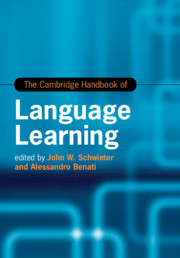Book contents
- The Cambridge Handbook of Language Learning
- Cambridge Handbooks in Language and Linguistics
- The Cambridge Handbook of Language Learning
- Copyright page
- Contents
- Figures
- Tables
- Contributors
- Acknowledgements
- Introduction
- Part I Theories
- Part II Methods
- Part III Skill Development
- Part IV Individual Differences
- 15 Working Memory in L2 Learning and Processing
- 16 Language Aptitudes in L2 Acquisition
- 17 Language Learner Motivation: What Motivates Motivation Researchers?
- 18 A New Look at “Age”: Young and Old L2 Learners
- 19 Identity
- Part V Pedagogical Interventions and Approaches
- Part VI Context and Environment
- Part VII Moving Forward
- Index
- References
18 - A New Look at “Age”: Young and Old L2 Learners
from Part IV - Individual Differences
Published online by Cambridge University Press: 25 June 2019
- The Cambridge Handbook of Language Learning
- Cambridge Handbooks in Language and Linguistics
- The Cambridge Handbook of Language Learning
- Copyright page
- Contents
- Figures
- Tables
- Contributors
- Acknowledgements
- Introduction
- Part I Theories
- Part II Methods
- Part III Skill Development
- Part IV Individual Differences
- 15 Working Memory in L2 Learning and Processing
- 16 Language Aptitudes in L2 Acquisition
- 17 Language Learner Motivation: What Motivates Motivation Researchers?
- 18 A New Look at “Age”: Young and Old L2 Learners
- 19 Identity
- Part V Pedagogical Interventions and Approaches
- Part VI Context and Environment
- Part VII Moving Forward
- Index
- References
Summary
Learner age has for a long time featured prominently in the research agenda of the second language acquisition (SLA) field. Arguably, a few decades ago this agenda was almost exclusively dominated by the concern with constraints of age on post-puberty learners that originated in the Critical Period Hypothesis (CPH) as formulated by Lenneberg (1967) for first language (L1) acquisition. The CPH links age of onset or age of acquisition (AOA) to biological constraints on what can be attained beyond puberty, and it was extended to second language (L2) acquisition through the work of Johnson and Newport (1989). Participants in CPH studies typically came to be immigrants arriving to the L2 community at different ages and acquiring the community language to different degrees. In these studies, participants’ ultimate attainment is examined and compared on the basis of their age of arrival (usually equated with AOA), and a negative association is usually found between AOA and ultimate attainment. In Long’s (2005) words, the aim of this line of research is to provide “evidence for the existence, scope or timing of maturational constraints on the human capacity for learning second (including foreign) languages” (p. 288).
Information
- Type
- Chapter
- Information
- The Cambridge Handbook of Language Learning , pp. 430 - 450Publisher: Cambridge University PressPrint publication year: 2019
References
Accessibility standard: Unknown
Why this information is here
This section outlines the accessibility features of this content - including support for screen readers, full keyboard navigation and high-contrast display options. This may not be relevant for you.Accessibility Information
- 8
- Cited by
